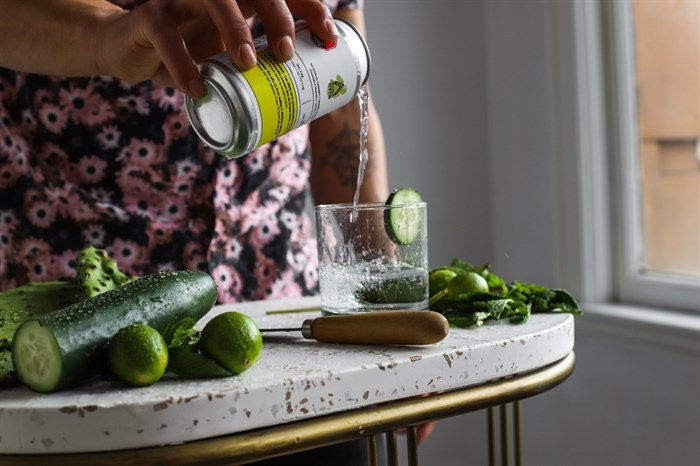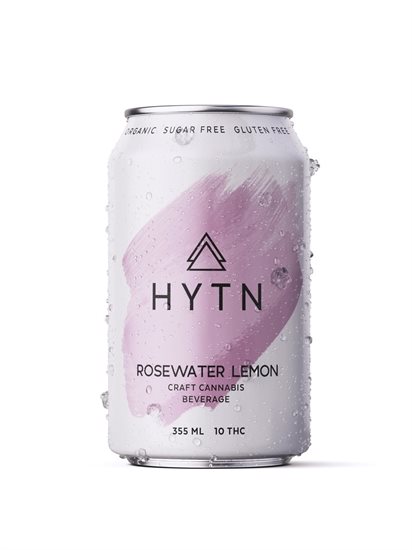Kelowna company wants to 'HYTN' your cannabis drinking experience
The challenge in creating a cannabis drink is not just finding a way for oil and water to mix, but to also make it taste good.
The men behind Kelowna-based HYTN (a play on the word ‘heighten’) Beverage Co. believe that, after two years of work, they’ve found the magic formula and hope to have their product on cannabis store shelves by this summer.
“Coming up with formulations that taste great and are stable and all those things, it takes time,” Jason Broome, chief operating officer for HYTN told iNFOnew.ca. “To do this right is not that easy.”
Broome was a cofounder of Flowr but, once it was up and running, he left to seek new challenges on the beverage front of the cannabis industry.
He has a pharmaceutical background so he’s teamed up with Big Surf Beer Company founder Dan Allen, Elliot McKerr and others to create and market something where others have had little success so far.
“You’ve got a bunch of cannabis people who are trying to do consumer packaged goods in the food world and those two worlds have rarely met,” Broome said. “To get the right skill set around the table, to do it well in both consumer packaged goods and in cannabis, is hard. You’re doing a bunch of stuff that has never been done before and teams that have never been built before so it’s not surprising that it’s not been the greatest start to Cannabis 2.0.”
Cannabis 2.0 refers to the second wave of cannabis legalization in Canada. Edibles, beverages and topicals were legalized in October 2019, a year after cannabis was decriminalized for smoking.
While some companies are doing beverages and edibles well, most are not, Broome said.
HYTN had signed a deal with Zenabis to produce the drinks in Nova Scotia but that fell through so they decided to set up in Kelowna. He and Allen both grew up in Kelowna. They are actively looking for partners to work with them in Eastern Canada.
In Kelowna, they’ve leased space in the new industrial area on Clement Avenue near downtown. While the location is ideally suited, the one glitch is that it is within 60 metres of homes on the other side of Clement. The city zone governing cannabis manufacturing says they have to be 60 metres away.
Kelowna city council agreed, earlier this week, to support a change to the zoning regulation. The initial rules were created to keep smelly cannabis growers away from homes.
Since HYTN is only infusing the cannabis and putting it in cans, council was unanimous in supporting a change in the zoning for this operation. It still has to go to a public hearing before operations can start.
The city did issue a building permit so HYTN is going to take a chance and start some work in its 5,000-square-foot plant and proceed with getting approvals from Health Canada. Broome hopes that can all be done in five months but realizes it may take longer.
The key to making the product work is, first of all, to get the cannabis oil to mix with water. The emulsifiers needed to do that are often bitter and cannabis oil itself doesn’t have the greatest taste. The product also has to be stable and properly carbonated.
HYTN has created four flavours: watermelon-mint, lemon grass-ginger, blood orange and rosewater lemonade.
All will produce the same kind of reaction which, as with alcohol, can vary from person to person, Broome said.
Unlike edibles, the effect is much quicker, similar to drinking a beer. Consumers, therefore, are more likely to control their intake because they can feel the effects.
“It’s essentially a vodka soda but uses cannabis as input, and you don’t taste the cannabis at all,” Broome said.
With edibles, the effect can be delayed so people may eat too much trying to feel the effects then ending up getting too high.
HYTN is also developing a gummy edible but is working on a formula that can make the effect come on sooner and be more predictable than some other edibles.
While it’s a whole different process, the gummies are way easier to produce.
“Four people can produce three million gummies in a year without much automation so the economics of that scale are, like, impressive,” Broome said. “If you’ve got a good recipe and you’ve got the knowledge, then operationalizing a gummy line is not that difficult.”
That may be so, but it’s still way more difficult than the “legacy” companies that made such products before cannabis was legal.
They didn’t have to go through all the rules to satisfy Health Canada while producing a legal food product.
For one thing, each of HYTN’s gummies has to pass through a metal detector before being sold, something not required of its “legacy” and illegal predecessors.
The Clement Avenue plant is a manufacturing facility only so it will not sell products on site or be open to the public.
To contact a reporter for this story, email Rob Munro or call 250-808-0143 or email the editor. You can also submit photos, videos or news tips to the newsroom and be entered to win a monthly prize draw.
We welcome your comments and opinions on our stories but play nice. We won't censor or delete comments unless they contain off-topic statements or links, unnecessary vulgarity, false facts, spam or obviously fake profiles. If you have any concerns about what you see in comments, email the editor in the link above.





